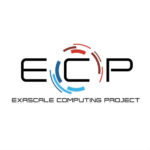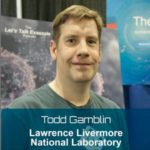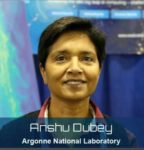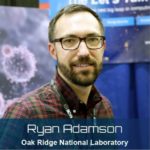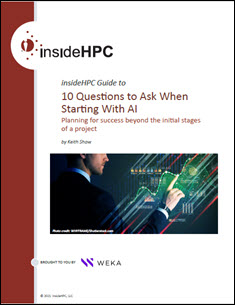In this episode of the Exascale Computing Project’s (ECP) Let’s Talk Exascale podcast series, Andrew Younge of Sandia National Laboratories discusses container technology and how it fits into the wider scheme of exascale and high-performance computing (HPC). Container technology has revolutionized software development by providing greater software flexibility, reliability, ease of deployment and portability. But […]
Let’s Talk Exascale: Chandrasekaran on Teaching Supercomputing and Leading ECP’s SOLLVE Project
In this episode of the Exascale Computing Project’s Let’s Talk Exascale, the ECP’s Scott Gibson interviewed Sunita Chandrasekaran, the new principal investigator of the ECP SOLLVE (Scaling OpenMP With LLVm for Exascale Performance and Portability) project. She replaces Barbara Chapman in the role, whom ECP Software Technology Director Mike Heroux said has been an invaluable […]
Let’s Talk Exascale: How Flux Software Manages Supercomputing Workflows
This episode of the Exascale Computing Project‘s Let’s Talk Exascale podcast series delves into a software framework developed at Lawrence Livermore National Laboratory (LLNL), called Flux, which is widely used for scheduling and managing modern supercomputing and HPC workflows. Joining in the discussion are Lawrence Livermore’s Dong Ahn, Stephen Herbein, Dan Milroy and Tapasya Patki […]
Let’s Talk Exascale: Optimizing the North American Power Grid for Reliability and Decarbonization
In this episode of Let’s Talk Exascale from the Department of Energy’s Exascale Computing Project (ECP) the focus is on an ECP application development project called ExaSGD, shorthand for Optimizing Stochastic Grid Dynamics at Exascale. The word “stochastic” means results are given in terms of probabilities instead of exact predictions — weather forecasting may be […]
Podcast: Spack Helps Automate Deployment of Supercomputer Software
In this Let’s Talk Exascale podcast, Todd Gamblin from LLNL describes how the Spack flexible package manager helps automate the deployment of software on supercomputer systems. “After many hours building software on Lawrence Livermore’s supercomputers, in 2013 Todd Gamblin created the first prototype of a package manager he named Spack (Supercomputer PACKage manager). The tool caught on, and development became a grassroots effort as colleagues began to use the tool.”
Podcast: ZFP Project looks to Reduce Memory Footprint and Data Movement on Exascale Systems
In this Let’s Talk Exascale podcast, Peter Lindstrom from Lawrence Livermore National Laboratory describes how the ZFP project will help reduce the memory footrprint and data movement in Exascale systems. “To perfom those computations, we oftentimes need random access to individual array elements,” Lindstrom said. “Doing that, coupled with data compression, is extremely challenging.”
Podcast: Accelerating the Adoption of Container Technologies for Exascale Computing
In this Let’s Talk Exascale podcast, Andrew Younge from Sandia National Laboratories describes the new SuperContainers project, which aims to deliver containers and virtualization technologies for productivity, portability, and performance on the first exascale computing machines are planned for 2021. “Essentially, containers allow you to encompass your entire environment in a simple and reproducible way,” says Younge. “So not only do I have my container image that has my application and my entire software stack with it, I also have a manifest for how I got there. That’s a really important notion for many people.”
Podcast: How Community Collaboration Drives Compiler Technology at the LLVM Project
In this Let’s Talk Exascale podcast, Hal Finkel of Argonne National Laboratory describes how community collaboration is driving compiler infrastructure at the LLVM project. “LLVM is important to a wide swath of technology professionals. Contributions shaping its development have come from individuals, academia, DOE and other government entities, and industry, including some of the most prominent tech companies in the world, both inside and outside of the traditional high-performance computing space.”
Podcast: Earth and Space Science for Exascale
In this podcast, Anshu Dubey of Argonne National Laboratory describes the Earth and Space Science application portfolio in the Exascale Computing Project (ECP). “By and large, these applications are solving partial differential equations, and so there is that generality,” Dubey said. “Most times, the range of scales is so huge that you cannot resolve every scale, so then you have to do something called subgrid models, which can be very boutique.”
Podcast: Software Deployment and Continuous Integration for Exascale
In this Let’s Talk Exascale podcast, Ryan Adamson from Oak Ridge National Laboratory describes how his role at the Exascale Computing Project revolves around software deployment and continuous integration at DOE facilities. “Each of the scientific applications that we have depends on libraries and underlying vendor software,” Adamson said. “So managing dependencies and versions of all of these different components can be a nightmare.”


